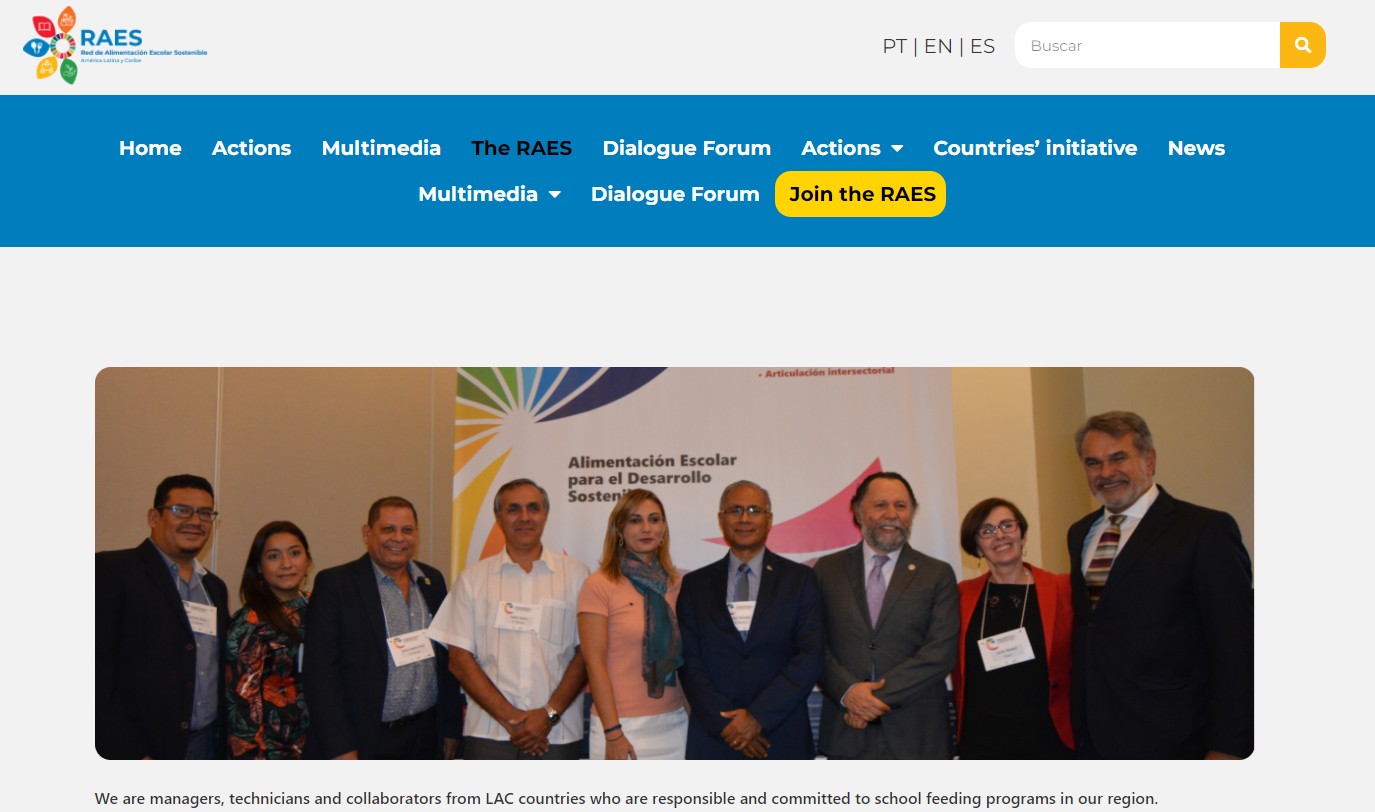Key actors from the countries of the region participated in the regional event that presented the website of the Sustainable School Feeding Network (RAES).
Brasilia, November 11, 2021 – The Sustainable School Feeding Network (RAES, for its acronym in Spanish) launched its virtual platform during a regional event, on November 10, with the participation of authorities and technicians from various countries of Latin America and the Caribbean. The website – www.redraes.org – is a tool that will increase the exchange of information and experiences about school feeding, promoted by RAES for years.
The RAES platform is available in three languages - English, Portuguese and Spanish – and has space for news, events, training, publications, a dialogue forum and testimonies from RAES members and participants from the activities.
Currently, the RAES Network has the participation of 21 of the 33 LAC countries in its activities. The expectation is to obtain the commitment of the countries in strengthening school feeding programs at the regional level, which today serve around 87 million students in Latin America and the Caribbean.

The voice of those who promote RAES
The event was organized by the Government of Brazil, through the Brazilian Cooperation Agency (ABC/MRE) and the National Fund for Education Development (FNDE/MEC), with the support of the Food and Agriculture Organization (FAO), through the project Consolidation of School Feeding Programs in LAC.
According to the Director-General of ABC/MRE, Ambassador Ruy Pereira, the steps taken by the RAES in recent years drive the Brazil-FAO Cooperation towards an even greater commitment as a regional initiative. “We want to make this collective commitment a reality by signing a joint declaration, which we have already shared with all the countries, and which is based on the right to education and right to adequate and healthy food,” said Pereira.
The Director of Educational Actions of the FNDE/MEC, Garigham Amarante Pinto, pointed out that the publication of the RAES platform reinforces the alliance among the countries. “Over the last decade, we have had the satisfaction of observing the evolution of the process of implementing and improving school feeding programs in countries facing similar challenges,” he said, highlighting the financial autonomy and the ability to maintain sustainability economics of this public policy.
Tool
For the general coordinator of the National School Feeding Program (PNAE, for its acronym in Portuguese), Karine Santos, the delivery of the platform is a milestone for the school feeding policy in the region. She also highlightinged the actions already carried out by the RAES, such as the Healthy Life course, which trained thousands of professionals from various Latin American countries. “We hope that with this platform we can deliver a tool that promotes integration, communication and dialogue among countries.” She coordinator proposed the creation of a working group to monitor the actions of the Network.
Commitment
The FAO Representative in Brazil, Rafael Zavala, pointed out that the Network will go far based on a great commitment from the partners involved. For Zavala, RAES will strengthen three important elements for school feeding programs: coverage, quality and continuity. From FAO Mesoamerica, the Nutrition Officer and technical leader of the Brazil-FAO Cooperation school feeding project, Israel Ríos, presented an overview of school feeding in the context of the transformation of food systems, highlighting the evolution of many countries from the region that strengthened their programs through the Sustainable Schools methodology and legal frameworks.
Cecília Malaguti, coordinator of the Trilateral South-South cooperation with international organizations of the ABC/MRE, stressed the importance of strengthening and consolidating the progress made in recent years in SFPs in the region, highlighting the commitment of the institutions during the process. She also commented on the need to “discuss a strategy to definitively structure, consolidate and guarantee the sustainability of the Network. This will be essential to further expand all the results that we have already achieved during this journey”.
New paths
Najla Veloso, coordinator of the Brazil-FAO International Cooperation school feeding project, commented that the RAES platform will symbolize, concretize and facilitate the work under way in the region to strengthen quality, institutionality and expansion of school feeding programs. “Based on this platform, we will open paths and draw joint strategies.” In summary, the coordinator said thatRAES was created in 2018 by the Government of Brazil, with the support of FAO, to strengthen the capacities of managers and promote the exchange of experiences on school feeding programs between countries in the region.
A network for school feeding
RAES was created in 2018 by the Government of Brazil, with the support of FAO, to strengthen the capacities of managers and promote the exchange of experiences on school feeding programs between countries in the region. Since its first meeting, the Network has had the participation of various countries: Argentina, Belize, Bolivia, Bahamas, Chile, Colombia, Costa Rica, Dominican Republic, Ecuador, El Salvador, Granada, Guatemala, Guyana, Honduras, Jamaica, Mexico, Panama, Paraguay, Peru, Saint Lucia and Saint Vincent and the Grenadines the constitution of a network represents a collective effort to promote interconnections, exchanges and advances in the face of the great current challenges.
The creation of the Network took into account the experience of more than six decades in Brazil in school feeding policies, a country whose program has wide coverage, benefiting, daily and universally, 41 million students. The RAES Network also considered the experience of international technical cooperation accumulated in more than ten years by the project Consolidation of School Feeding Programs in Latin America and the Caribbean, as part of the actions of the Brazil-FAO International Cooperation Program






